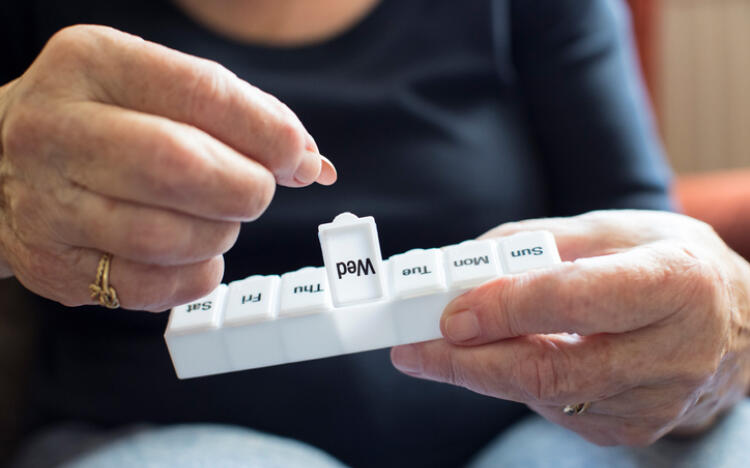You can manage emotional stress by addressing your mood or distress symptoms. Simple strategies and changes in the delivery of care is recommended.1 If you need medical treatment, your doctor will tailor treatment to your needs. For instance, they may prescribe antidepressants for moderate to severe depression.2
Your health professional should review your medicines often. When this happens depends on the medicine you are taking. Talk to the doctor or other health professional about adding medicine reviews into a care plan. Using a medicines list can help you manage your medicines. Talk to the doctor or other health professionals. They can tell you about the active ingredient and brand names of the medicines you are taking.
You can read about groups of medicines that may help reduce the symptoms of distress below.1,3,4
Anticholinesterases
Some of the symptoms of Alzheimer's disease are thought to result from a lack of acetylcholine. This is a chemical that sends signals in the brain. These medicines help increase the amount of this chemical in the brain. This can help with the symptoms of Alzheimer's disease.
|
Target distress symptom
|
Common side effects
|
Efficacy
|
|
agitation
|
having the runs, anorexia, having trouble sleeping, vivid dreams, problems with bladder control
|
delays cognitive decline by: - 6 months in 25–50% of people with dementia,
- 1 year in 12–20% of people with mild to moderate Alzheimer's disease
|
Other medicines for Alzheimer's disease
Memantine
Memantine works by blocking a certain type of receptor called NMDA receptors in the brain. They are involved in sending nerve signals in the brain, eg, in learning and memory. Memantine protects these receptors from a chemical called glutamate, which might be adding to brain degeneration.
|
Target distress symptom
|
Common side effects
|
Efficacy
|
|
agitation
|
feeling confused, feeling drowsy, having trouble sleeping, hallucinations
|
moderately slows cognitive decline
|
Antipsychotics
Antipsychotics work by changing the effect of certain chemicals in the brain. These include dopamine, serotonin, noradrenaline and acetylcholine. These chemicals can impact how you behave, your mood and how you feel. There are many different antipsychotics. They are split into two types – the newer or atypical antipsychotics, and the older typical antipsychotics.
|
Target distress symptom
|
Common side effects
|
Efficacy
|
|
psychosis, aggression
|
feeling sedated, feeling anxious, feeling restless, feeling agitated, pneumonia, increased heart rate. Has been linked with increased risk of death
|
of limited use for people with dementia
|
Antidepressants
Antidepressants are thought to work by raising certain chemicals in the brain. These include serotonin and noradrenaline. They are linked to your mood and how you feel.
|
Target distress symptom
|
Common side effects
|
Efficacy
|
|
depression
|
broken sleep, headache, feeling drowsy, tremors, feeling the urge to vomit (nausea), anorexia, problems with bladder control
|
can take 2 weeks or more to see your mood improve
|
Anxiolytics
These medicines help with the symptoms of anxiety. As with those listed above, they work by changing levels of different chemicals in the brain.
|
Target distress symptom
|
Common side effects
|
Efficacy
|
|
agitation, anxiety, sleep disorder
|
falls, feeling confused, rebound insomnia
|
effective for treating anxiety but recommended for short-term use only (2–4 weeks)
|
References
- Psychotropic Expert Group. Therapeutic guidelines: psychotropic. Version 7. Melbourne: Therapeutic Guidelines Limited, 2013.
- Burns K, et al. Behaviour Management. A Guide to Good Practice. Sydney: Dementia Collaborative Research Centre – Assessment and Better Care, University of NSW, May 2012 (accessed 22 December 2015).
- Royal Australian & New Zealand College of Psychiatrists. Assessment and Management of People with Behavioural and Psychological Symptoms of Dementia (BPSD). Sydney: NSW Ministry of Health and RANZCP, 2013 (accessed 23 December 2015).
- Australian Medicines Handbook. eAMH. Adelaide: Australian Medicines Handbook, 2015 (accessed 23 December 2015).
